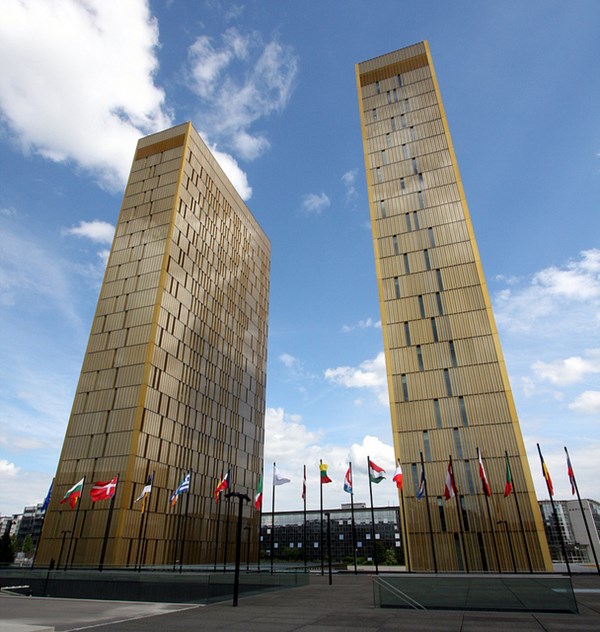EU court considers claim filed by Rosneft against British authorities
On Tuesday, February 23rd, the European Court of Justice in Luxembourg began to consider a claim by Rosneft against the British authorities. The Russian state company claims that London has interpreted the EU sanctions too broadly, as reported by Deutsche Welle.
The Court of Justice will consider the legality of the sanctions imposed against Russia in 2014. The Court will clarify the meaning of certain concepts contained in the EU sanctions regulations. According to Rosneft, the United Kingdom has interpreted them too broadly which has led to additional unjustified restrictions for the company in the international markets.
The lawsuit in London
In accordance with the sectoral sanctions, imposed by the European Union in connection with the events in Ukraine, it's prohibited for persons and companies from the EU to buy and sell stocks and bonds of a number of Russian state-owned companies, including Rosneft. Brussels also prohibits European banks to provide financial assistance and services to Russian companies under sanctions when they are trying to raise funds. Rosneft was directly influenced by the ban on the supply of equipment and technology, in Russia, that can be used for underwater mining projects and oil exploration at depths of over 150 meters, as well as on the Arctic shelf and the shale.
In the fall of 2014, the state company contested these sanctions in the European courts, including the High Court in London. In the British capital, Rosneft has filed a lawsuit against the Treasury of the United Kingdom, the Department for Business, Innovation and Skills and the Financial Conduct Authority. Rosneft insists that some of the wording in the EU sanctions legislation is too vague and imprecise which is contrary to the principle of legal certainty. Therefore, it has allegedly allowed British authorities to interpret these concepts too broadly.
Lost in translation
In particular, the claim concerns the concept of "financing and financial assistance". According to the EU sanctions resolution, it covers grants, loans and export credit insurance. At the same time, the document doesn't clearly state if processing payments by banks is included. According to the British side, this definition includes payment services while Rosneft insists that it should be excluded.
Another difference of opinion is in the interpretation of the sanctions legislation regarding restrictions on the global depositary receipts, for shares of Rosneft (GDR), issued before September 12, 2014, when the EU extended sanctions that affected the oil industry came into force.
In January of 2015, the High Court in London forwarded Rosneft's claim to the European Court of Justice. Since the state-owned company has challenged a ruling of the European Union, a British court has no authority to rule in this case, according to the Court judgment.
What will the EU Court do?
The claim has now been transferred to the Court of Justice and will be considered in Luxembourg. The oral hearing is scheduled for Tuesday. It will be held by a Grand Chamber of 15 judges, according to the information received by a Deutsche Welle broadcaster from the press service of the Court of Justice. During the meeting, the court will hear the opinions of the representatives of Rosneft and the defendants.
According to the court, the judges will have to figure out whether "financial assistance" means payment processing by the banks and whether the EU imposed restrictions on the issuing of GDR applies to shares issued before September 12, 2014.
Rosneft also claims that the EU sanctions documents do not provide a clear definition of the concept of "shale". The judges in Luxembourg could clarify this wording, but only if they deem it necessary.
The decision is mandatory for everyone
Because of the pan-European nature of the sanctions, the judgment made by the Court in Luxembourg will be binding for both the British Court and the authorities in all EU countries, Joe Hage, the London-based lawyer representing the interests of Rosneft, explained to RBC in early 2015. Before filing a lawsuit in the High Court in London, Rosneft has already challenged the sanctions in the same EU Court in Luxembourg. This was the first claim, the essence of which had not been disclosed then, filed by the company in October 2014.
The outcome of the lawsuit against the government of Great Britain will be known in a few months. At first, the Advocate General has to submit his opinion to the judges of the Court of Justice. This will take between two to four months, the press service of the court explained. Afterwards, the Court usually takes three to six months to reach a final decision.
What are the chances of success?
Experts doubt that any attempts of Rosneft to challenge the sanctions imposed by the European Union will succeed. If the company is able to convince the court that some of the wording in the sanctions resolutions are too vague, the EU may have to make amendments to the document, Reid Whitten, lawyer of Sheppard, Mullin, Richter & Hampton in Brussels said. In this case, Rosneft will also be able to use this victory as a PR-move, he added.
However, it is highly unlikely that the company will be able to challenge the sanctions in general. "It's hard to imagine that the lawyers of Rosneft will be able to build a convincing argument," Whitten stated. Even if the company does succeed, he said, and is excluded from the scope of the European restrictive measures, Brussels will likely rewrite the sanctions resolution in such a way that Rosneft will fall under the same sanctions again.
Cases where individuals or companies are excluded from the sanctions list, after winning in court, are a rarity, the lawyer of the firm Field Fisher Waterhouse LLP in Brussels, Laurent Ruessmann, said to Bloomberg at the end of 2014. Following the Rosneft case, the sanctions imposed by the EU were challenged in court by the banks Sberbank, VEB and VTB, as well as by the company Gazprom Neft.
